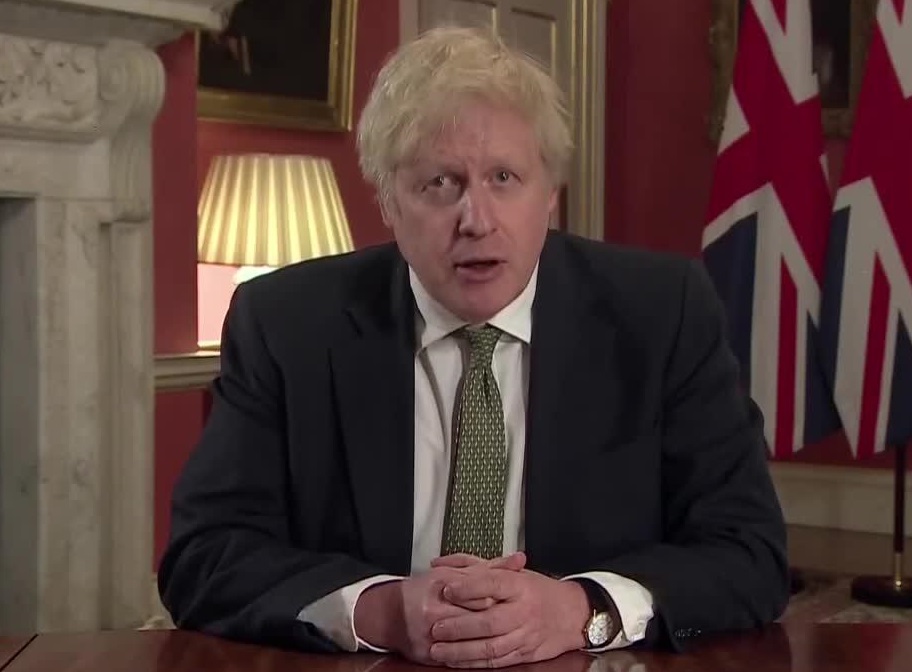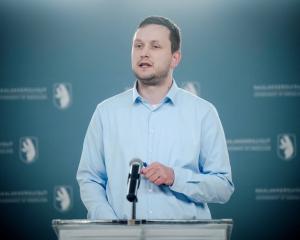British Prime Minister Boris Johnson has ordered England into a new national lockdown to try to slow a surge in Covid-19 cases that threatens to overwhelm parts of the health system before a vaccine programme reaches a critical mass.
Johnson said a new, more contagious variant of the coronavirus was spreading at great speed and urgent action was needed to slow it down.
"As I speak to you tonight, our hospitals are under more pressure from Covid than any time since the start of the pandemic," Johnson said in a televised address to the country on Monday night (local time) as he ditched his regional approach to fighting the virus.
"With most of the country already under extreme measures, it's clear that we need to do more together to bring this new variant under control.
"We must therefore go into a national lockdown, which is tough enough to contain this variant. That means the government is once again instructing you to stay at home."
Johnson said the measures would include school closures from Tuesday and rules requiring most people to stay at home apart from essential shopping, exercise and other limited exceptions.
He said that if the timetable of the vaccination programme went as planned and the number of cases and deaths responded to the lockdown measures as expected, it should be possible to start moving out of lockdown by the middle of February.
However, he urged caution about the timetable.
"We must therefore go into a national lockdown, which is tough enough to contain this variant," Johnson said in a televised address on Monday night (local time).
"That means the government is once again instructing you to stay at home."

England had been divided into four tiers of restrictions, depending on the prevalence of the virus, with the vast majority of the country in Tiers 3 and 4 where social mixing is restricted and restaurants and pubs are closed. However, Health Secretary Matt Hancock said earlier that the rules in Tier 3 were clearly not working.
Johnson's government earlier on Monday touted a scientific "triumph" as Britain became the first country in the world to start vaccinating its population with Oxford University and AstraZeneca's Covid-19 shot.
But as the country grapples with the world's sixth highest death toll and cases repeatedly reaching highs, Britain's four chief medical officers and the medical director of England's health service said the alert level should move to its highest.
What can be expected from new lockdown?
The new lockdown, expected to be in place until the middle of February, will come into effect in law, and parliament is expected to consider it on Wednesday. People will be urged to follow the new restrictions from later on Monday.
STAY AT HOME
The main message from the government is for people to stay at home if they can.
People may only leave home if they are unable to work there, for example in the construction sector, or if they are key l workers. They may also leave home to shop for necessities such as food and medicine, take exercise, provide care or help to a vulnerable person or attend medical appointments.
The police will have legal powers to enforce the rules, including with fines and dispersing orders.
SCHOOLS CLOSE
From Tuesday, all schools and colleges will move to remote provision except for vulnerable children and the children of key workers.
Early years settings will remain open.
University students will be expected to study from their current place of residence until at least mid-February.
NON-ESSENTIAL SHOPS CLOSE
All non-essential retail, hospitality and personal care services must now close if they are not already shut.
Restaurants and other premises can continue delivery or take away but take-aways of alcohol will no longer be allowed.
Zoos will close.
INTERNATIONAL TRAVEL
Only essential journeys are permitted.
SPORT
Outdoor sport venues including outdoor gyms, tennis courts and golf courses will close and outside team sports will not be permitted.
Elite sport, including Premier League soccer, will continue.
SHIELDING
Those who are clinically extremely vulnerable should stay at home as much as possible.
PLACES OF WORSHIP
Places of worship can remain open for individual prayer and communal worship but people will have to adhere to social contact rules.

New vaccine launched
As Britain grapples with the world's sixth highest death toll and cases hit a new high, the country's chief medical officers said the spread of Covid-19 risked overwhelming parts of the health system within 21 days.
The surge in cases has been driven by the new variant of Covid-19, officials say, and while they acknowledge that the pandemic is spreading more quickly than expected, they say there is also light at the end of the tunnel - vaccinations.
Johnson's government earlier touted a scientific "triumph" as Britain became the first country in the world to start vaccinating its population with Oxford University and AstraZeneca's Covid-19 shot.
Dialysis patient Brian Pinker on Monday received the first vaccination outside of a trial.
"I am so pleased to be getting the COVID vaccine today and really proud that it is one that was invented in Oxford," said the 82-year-old retired maintenance manager, just a few hundred metres from where the vaccine was developed.
But even with the vaccines being rolled out, the number of Covid-19 cases and deaths keep rising.
More than 75,000 people in the United Kingdom have died from Covid-19 within 28 days of a positive test since the start of the pandemic. A record 58,784 new cases of the coronavirus were reported on Monday.
Moving a few hours ahead of Johnson, Scottish First Minister Nicola Sturgeon imposed the most stringent lockdown for Scotland since last spring.
The devolved administration in Wales said all schools and colleges there should move to online learning until January 18.
Johnson's government has secured 100 million doses of the Oxford/AstraZeneca vaccine which can be stored at fridge temperatures between two to eight degrees, making it easier to distribute than the Pfizer shot.
Six hospitals in England are administering the first of around 530,000 doses Britain has ready. The programme will be expanded to hundreds of other sites in coming days, and the government hopes it will deliver tens of millions of doses within months.
The US Centers for Disease Control and Prevention said it had administered 4.2 million first doses of Covid-19 vaccines as of Saturday morning and distributed 13.07 million doses.
More than a tenth of Israel's population have had a vaccine and it is now administering more than 150,000 doses a day.
Germany and Denmark are looking into the possibility of delaying administering a second dose of the Pfizer vaccine to make scarce supplies go further, after a similar move by Britain.
Britain became the first Western country to approve and roll out a Covid-19 vaccine, although it is behind Russia and China which have been inoculating their citizens for months.












